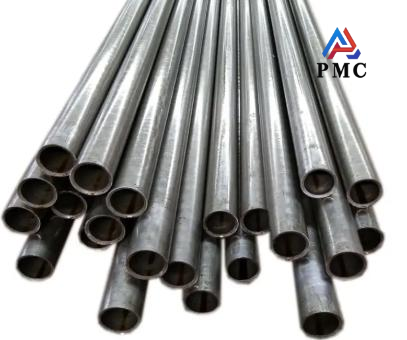The precision of seamless steel pipe refers to the degree of control over the deviation of the outer diameter, inner diameter, wall thickness, length and other dimensions of the steel pipe during the manufacturing process. High-precision seamless steel pipes require strict control of relevant parameters during processing and manufacturing to meet the needs of specific applications.
Key indicators affecting the accuracy of seamless steel pipes
- Outer diameter accuracy
Definition: The deviation between the actual value and the theoretical value of the outer diameter of the steel pipe.
Unit: millimeter (mm).
The outer diameter tolerance grades are usually divided into:
Normal accuracy (±1%~±2%).
High precision (±0.1%~±0.5%), used in hydraulic systems and precision machinery manufacturing and other fields.
- Wall thickness accuracy
Definition: The deviation between the actual and theoretical value of the steel pipe wall thickness.
Unit: millimeter (mm).
Wall thickness deviation is an important factor affecting the strength and stiffness of pipes. The high-precision pipe wall thickness tolerance can reach less than ±5%.
- Roundness (ovality)
Definition: The difference between the maximum and minimum outer diameters of a steel pipe section.
The roundness of high-precision steel pipes is usually less than 0.02%.
- Straightness
Definition: The degree of deviation from a straight line in the length direction of a steel pipe.
The deviation value of a high straightness steel pipe is generally below 0.1%.
- Length accuracy
Definition: The error between the actual length and the theoretical length.
Usually the length deviation is controlled within ±5mm or less.
- Surface quality
High-precision seamless steel pipes are usually required to have smooth inner and outer surfaces, free of scratches, pitting, cracks and other defects, and the surface roughness (Ra value) can be controlled within the range of 0.2~1.6 μm.
Precision grade of seamless steel pipe
According to the national standard (GB) or international standard (ISO, DIN, ASTM, etc.), the precision of seamless steel pipes can be divided into ordinary precision, high precision and ultra-high precision.
For example:
Ordinary seamless steel pipe: moderate precision, used in mechanical structures and general fluid transportation.
Precision seamless steel pipe: high precision, used in hydraulic, pneumatic systems, automotive parts and other fields.
Ultra-precision seamless steel pipe: the highest precision, used in high-demand fields such as aerospace and nuclear industry.
Methods for improving the precision of seamless steel pipes
- Improved manufacturing process
Use cold drawing and cold rolling processes to improve dimensional accuracy.
Use multiple drawing and annealing processes to reduce internal stress and dimensional deviation.
- Precision testing equipment
Use advanced online testing equipment for outer diameter, inner diameter and wall thickness to adjust production parameters in real time.
- High-quality raw materials
Select high-quality steel billets with good uniformity and few impurities to reduce errors caused by raw material defects.
- Strictly control the heat treatment and straightening process
Optimize material properties and improve straightness through quenching, tempering and other processes.
- High-precision molds
Use high-precision core rods and molds for processing to reduce dimensional deviations.
The influence of seamless steel pipe precision on application
Mechanical manufacturing: High-precision steel pipes can reduce the amount of machining and improve the consistency of part dimensions.
Hydraulic system: High-precision inner diameter ensures smooth oil flow and reduces leakage.
Automotive manufacturing: Improving the reliability and safety of vehicle components.
Aerospace: The requirements for high-precision tubes are particularly stringent to ensure pressure and high temperature resistance.
Read more: How to ldentify the Material and Specifications of SMLS Steel Pipes?

Leave a Reply
You must be logged in to post a comment.